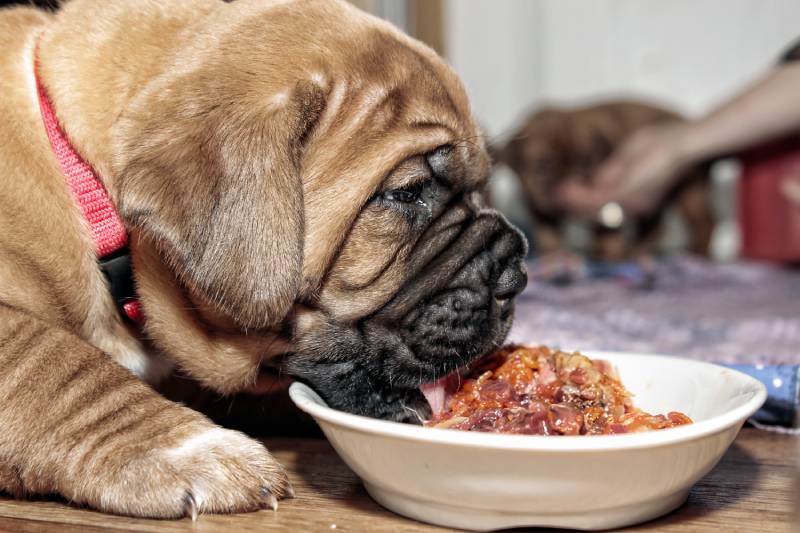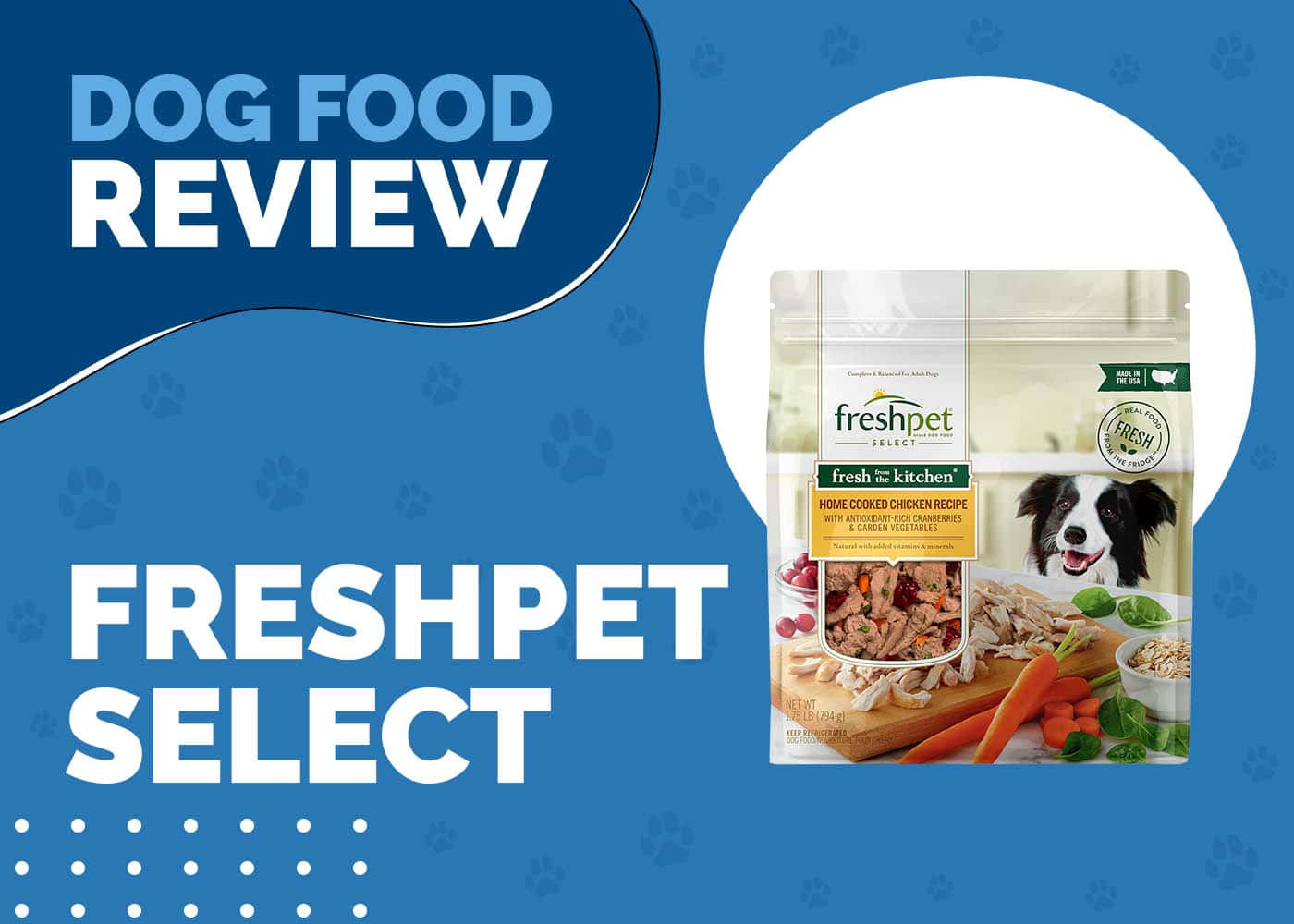Can Dogs Eat Walnuts? Vet Approved Facts & FAQ

Updated on
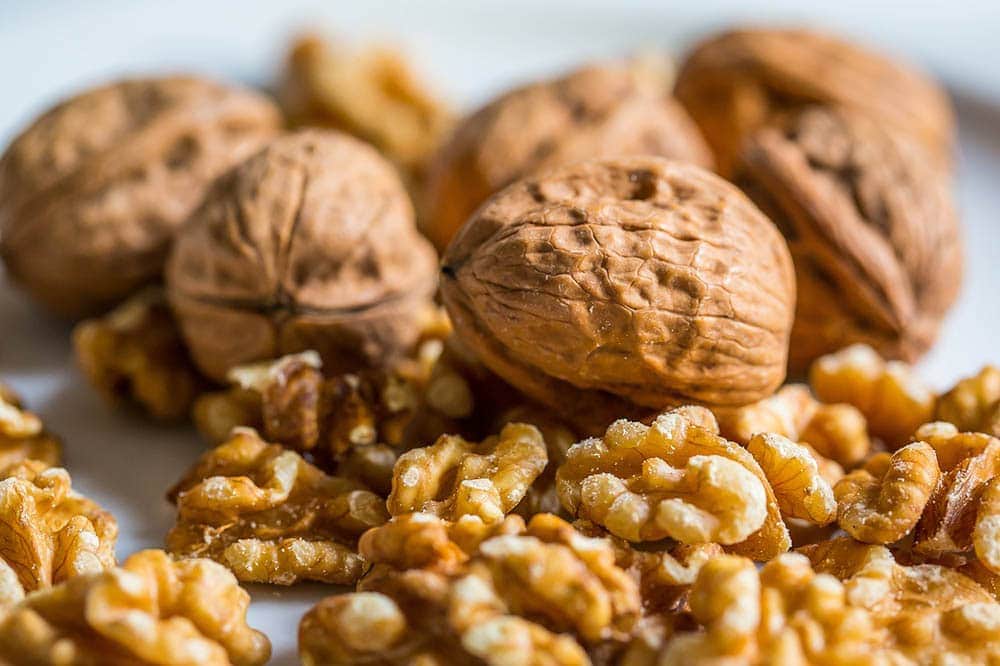
When your pup shows you that adorable face, it can be hard to deny them a piece of whatever you are eating at the time. Unfortunately, you have to be very careful about what you give your pooch to eat. This includes nuts.
Walnuts are a healthy treat for humans, but are they safe for dogs? Can your dog eat them? Fortunately, we have a quick answer to this question. No, dogs should not be eating walnuts. Here’s the kicker, though. In the case of this large nut, there is a difference between the different types of walnuts, whether your pooch can eat them, and whether or not they are safe. Let’s look into that a little deeper…
Can Dogs Eat Walnuts?
It is important to note that some forms of walnut can be toxic to your dog. Even if they are not, there are many other issues that you will need to contend with. Let’s take a look at the most important aspects.
Toxic Walnuts
There are many different types of walnuts, but the three most common are black walnuts, English walnuts, and Japanese walnuts. The one you want to be extra careful of is the black variety. Take a look at the three different types below:
English Walnut
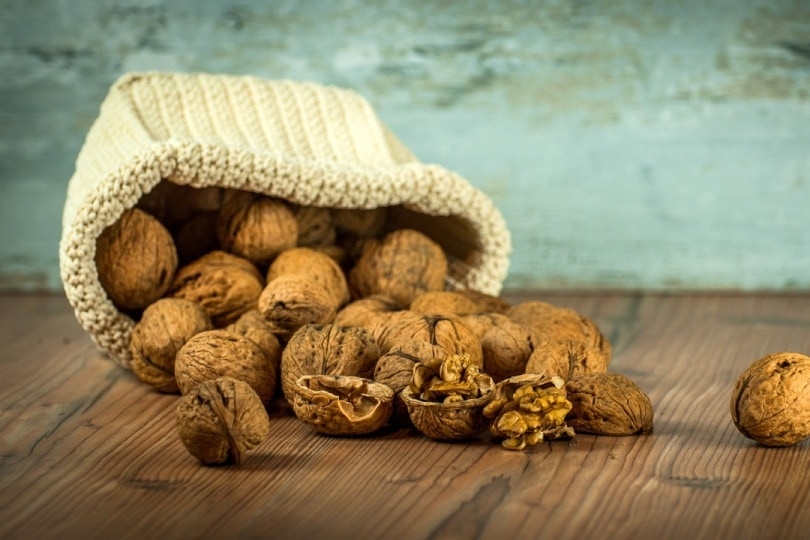
The English Walnut is not as toxic as others, and it is less likely they will affect your pooch if they only eat a very small amount as an occasional treat. That being said, some dogs can still have serious side effects, as they contain a lot of fat. This may lead to an upset stomach, and there is a possible link between excess dietary fat and pancreatitis in dogs, although research is still in progress on this.
Another quite prominent thing to note is mold. Like other walnuts, fungi that are present in the environment, in the soil and on plants, can contaminate the outer shells. These molds produce toxins, also called mycotoxins, with aflatoxin being one of the most common kinds, that are harmful to human and animal health.
This mold can infect your pet if it is ingested, causing signs such as lethargy, vomiting, diarrhea, jaundice and liver damage, bruising, bleeding, uncontrolled seizures, and tremors. This type of nut is native to Iran, but it is commercially used more often than others as the shells are easier to break. Be advised, though, this makes it easier for pups to snack on.
Japanese Walnut
Like the one above, the Japanese walnut is not toxic in its raw form. Though it can still cause stomach upset or illness, “walnut poisoning” only occurs when canines eat a moldy shell. This type of walnut is indigenous to Japan, but it was brought to the United States and Canada around 1870.
It has been noted that this particular type of walnut is very hardy. It can survive in extreme temperatures and fluctuations. This is important to note as the plant could be in your area without your knowledge. Again, you should keep your pet from eating any shelled walnuts.
Black Walnut
As mentioned, this is the walnut most likely to cause toxicity in your dog. The exact mechanism remains unknown. Juglone is a component of black walnuts (found in highest concentrations in the buds, nut hulls, and roots) that can cause certain sedative effects in some animal species. It is believed that other compounds alongside juglone are responsible for toxicity signs in dogs and horses alike. Signs seen when dogs ingest black walnut hulls, shells, or even actual wood shavings, are usually vomiting, lethargy, diarrhea, and reduced appetite, while less than 25% of dogs may develop disorientation, uncontrollable tremors and shaking, wobbliness and falling, weakness, and even seizures. Interestingly, dogs that ingested the wood were four times more likely to have neurological or signs of muscular weakness.
When the black walnut starts to mold or has already been contaminated with the mold during growth and processing, it can contain tremorgenic mycotoxins that will make dogs ill. If ingested, it causes a bevy of serious health issues such as the already mentioned neurological signs, tremors, and seizures.
Originating in the Northeastern United States and Canada, this is the most flavorful walnut. They are also more likely to grow in residential areas where your pooch can pick one up for a snack.
Even when the nut is ripe, you need to keep your dog away from these walnuts. If you live in an area where they grow, caution is advised. It is important to not let your pet roam around an area where they may have dropped to the ground or where there are shavings of the tree.
Health Issues Associated with Walnuts
Outside of the problems associated with dogs trying to swallow walnut shells, the most important reason why you should not be giving you dog walnuts is because of the possible side effects we already discussed that are associated with mold contamination and the toxicity of the black walnut. The most common and prominent of those ailments are gastrointestinal problems, although neurological disorder and muscular weakness is also very common, especially due to the mycotoxins.
Most dogs are unable to properly digest walnuts causing them a lot of discomfort in the process. Some of the issues include gas, diarrhea, stomach pain, nausea, and vomiting. Be that as it may, it is not the worst of it. The nuts and the hard shell can also cause choking or lead to a stomach or intestinal obstruction.

As walnuts are hard to break down, the pieces can get stuck in your dog’s esophagus, stomach, and bowels. This can be life-threatening and will require surgery or endoscopy in most cases, so you will need to consult a vet right away. Here are some signs of a gastrointestinal obstruction:
- Vomiting
- Lack of appetite
- Lethargy
- Diarrhea
- Weight loss
- Abdominal pain
- Abdominal swelling
- Fever
- Dehydration
- Shock
In some dogs, walnut shells and walnuts may pass the digestive tract and get stuck on the way out, during defecation. In this case, your dog may be straining and struggling to pass stool, while whining or passing blood instead. This also warrants an urgent exam by your vet.
Why Walnuts Are Not Safe
Even though there are some hefty health risks associated with feeding your dog walnuts, some pups may never have a single moment of discomfort from this nut. Be that as it may, there are still other concerns you should know about. One of the more concerning issues is the potential choking hazard.
As we have already discussed, walnuts, without their shell, are the perfect size to make a small dog choke. On the flip side, walnuts in their shells are more apt to get caught in the throat of a large dog. Canines are notorious for inhaling their food. They will not stop to chew the nut, which can then cause a blocked airway to occur.
If choking happens and a piece of the walnut gets stuck at the back of the throat, your dog’s airway may become compromised, and this is an emergency. Dogs that are experiencing choking are trying to cough and retch and may be pawing at their mouth or drooling excessively, vomiting, or their tongue and gum color may become blue, if the airway is blocked. Open your dog’s mouth and reach as far back as you can with your fingers, to remove the piece that is causing the blockage. Be careful not to get bitten at the same time. You can attempt the Heimlich maneuver, but don’t waste time for too long and get your dog to the vet immediately.
There is also walnuts’ high fat content to consider.Obesity is a real issue among dogs, and it should not be taken lightly. Eating a small piece of walnut will not make your dog obese, but if they are regularly eating fatty and high calorie foods, without having enough physical exercise, they could certainly gain unwanted extra weight.
Obesity was recently investigated in a study conducted by the Royal Veterinary College in London, United Kingdom, and has been associated with several issues, such as:
- Arthritis
- Shortened lifespan
- Some tumors
- Breathing problems
- Heart disease
- Diabetes
Unfortunately, many pet parents feel that a small snack such as a nut won’t make a difference. While that is strictly true, giving them one often leads to two and so on. Couple that with other unhealthy fats, and your pet may end up with some of these issues.
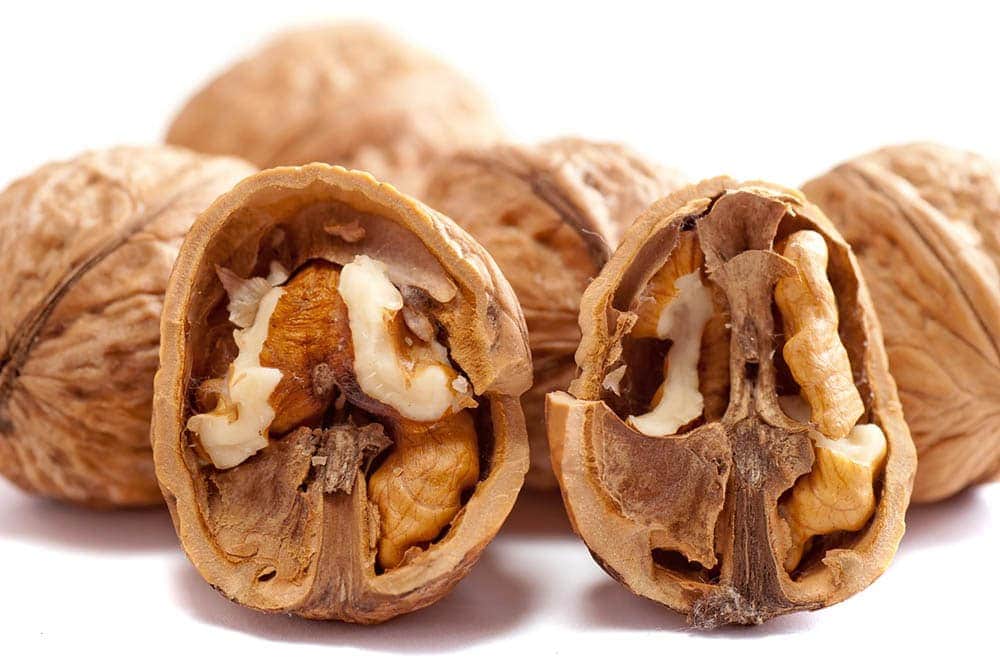
Common Dog and Walnut Questions
When it comes to walnuts and canines, there is not a lot of research. Out of the entire nut family, walnuts fall below the average line when it comes to information. This is likely why there are a lot of random questions about the effects of this nut on your dog.
Should You Worry If Your Dog Eats A Walnut?
Even though there is a lot of info above that might make you nervous, it is important to keep in mind that eating one walnut is unlikely to harm your pet. If one happens to land on the floor and goes over your dog’s teeth and gums before you can prevent it, don’t panic. Chances are they will be fine. Call your vet to make sure your pooch doesn’t need a check up, unless they may have eaten a black walnut, and discuss the signs to look out for with your vet.
Walnuts are not good for your pet even in moderate quantities. They can make them sick with stomach issues, if nothing else. And they can be contaminated with mold that isn’t always obvious, meaning your dog may ingest mycotoxins in the process, A random walnut, though, is rarely a cause for panic.
If your pet happens to eat a walnut, the best thing to do is monitor them for signs of intestinal blocks, toxicity, and choking. Though these things are unlikely, it’s better to be safe rather than sorry. If you see any signs, reach out to your emergency vet right away. You can still contact them for some peace of mind if you’re not sure what to do next.
Can Dogs Be Allergic to Walnuts?
Nut allergies are a possibility in canines, and you may find some walnut sensitivities among them. That being said, it is extremely rare, with very few reported cases, and there is not enough evidence-based information on this topic. Even the more common peanut allergy is less prevalent in dogs than it is in humans.
Of course, it doesn’t hurt to know what signs to look for, just in case. Signs of an allergy include lethargy, skin irritation (commonly exhibited by excessive licking, scratching and itching), persistent ear infections, skin rashes, head shaking, paw biting, and snout wiping. All of these can point to an issue, and you should once again consult your vet.
On a side note, if your pup is allergic to peanuts, they have a higher risk of having the same problem with walnuts. It is advisable to restrict all nuts from their diet in this event, but as we have already mentioned, this is extremely rare.

How to Serve Walnuts
Some people consider walnuts to be a healthy snack for their dog as they contain good levels of protein and other nutrients like antioxidants and omega fatty acids. However, the protein level is not that significant, and walnuts contain a lot of fat, which doesn’t agree with dogs and their stomachs. As mentioned before, there are those pups that will be able to eat a very small amount of nuts without any digestive issues. But do not count on walnuts providing any health benefits for your dog, as the nutritious ingredients are in such tiny amounts that they are considered virtually insignificant. And any more than this will likely make even the sturdiest dog sick, which is just not worth the risk.
If you still want to give your dog a very small piece of walnut, make sure it is unsalted and without any flavoring, and do this just on very special occasions. Salt can cause many health issues, as can other spices like nutmeg.
Something else to note is that you do not want to give your dog whole walnuts or ones in their shell, as this may lead to choking. As we talked about before, mold and mycotoxins can be present on the shells, causing toxicity in your pooch. Even store-bought nuts can have trace amounts of the fungi and toxin on their shells. Plus, they are a serious choking risk. Again, we don’t recommend feeding your dog walnuts, as your pooch will not benefit from it in the slightest, and the risk of this “treat” causing them serious health issues is unfortunately high.
What About Food with Walnuts?
Another common question is whether or not you can give your pet food with walnuts already in it. This is another negative. You want to steer clear of foods like walnut butter, cookies, loaves of bread, etc. These products typically have a lot of sodium and other additives that are harmful to canines. They also tend to be high in sugar, artificial ingredients, and processed foods, or may even contain xylitol, which is toxic for dogs.
Most recipes where you would find walnuts will also have things like preservatives and additives that are not beneficial. You need to be wary of baking powder and soda, spices like cinnamon and nutmeg, onion, garlic, and many other human foods that are not good for your pet. In general, it is best to stay away from foods that have walnuts.
And Mixed Nuts?
Some pet-parents wonder about giving their pet mixed nuts in their food or other treats. This is also not a great idea. Not only will walnuts typically cause stomach issues and possibly other issues, but other nuts may be just as unhealthy. Almonds, macadamia, and pistachios are also not a good idea. If in doubt, avoid nuts altogether. Plus, these nut mixes also often contain raisins, which are extremely toxic for dogs.

Walnut Alternatives
If you have a nut lover on your hands, it can be difficult to deny that adorable face. Even the scariest looking canine knows how to put on that sad “how could you not feed me?” look that is agonizing to ignore.
If you are a nut lover yourself and you want to share the snack wealth, there are some alternatives you can try. First, roasted or toasted plain shelled peanuts in small amounts are typically harmless to dogs. Unless they have a preexisting allergy, this could be a good option.
Dog “designed” peanut butter and cashews are also good alternatives. With all three, however, you need to share them in moderation. Pretty much all nuts are high in fat, so keeping it to small quantities is best. Finally, always check with your vet before adding any new foods to your dog’s diet. They will be able to guide you in what’s best for their health, age, and lifestyle.
Conclusion
So, are walnuts safe and healthy for your dog to eat? We have to go with no. Although they may have some nutritional benefits, the health risks are too high. Even if the possibility of some of the more severe illnesses is less likely, stomach upsets, mycotoxin exposure, and choking are just some of the real dangers that happen frequently.
Feeding your pup a healthy and nutritious diet is an essential part of pet-parenthood. It’s important to be knowledgeable about their needs, what they can have, and what you should avoid. As always, you should reach out to your vet with any diet questions.
We hope you enjoyed this article, and it has answered all of your questions!
Featured image credit: maxmann, Pixabay





